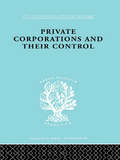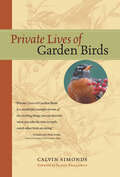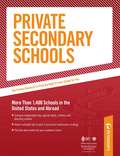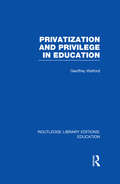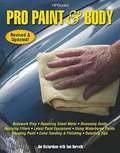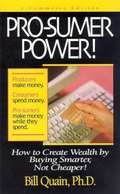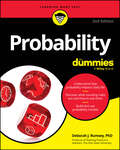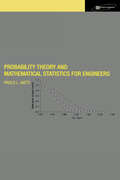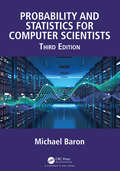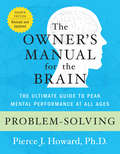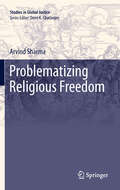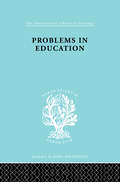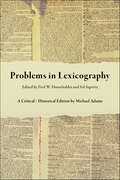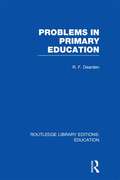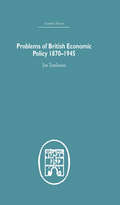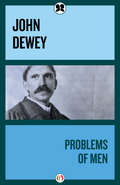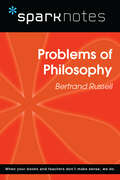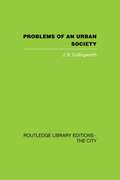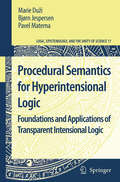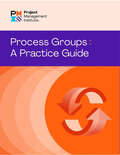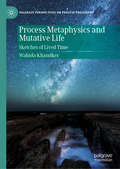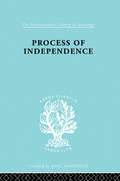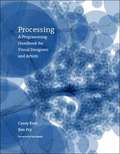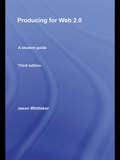- Table View
- List View
Private Corporations and their Control: Part 2 (International Library of Sociology #Vol. 160)
by A.B. LevyFirst published in 1998. Routledge is an imprint of Taylor & Francis, an informa company.
Private Lives of Garden Birds
by Julie Zickefoose Calvin Simonds Scott ShalawayBrimming with stories, wisdom, and expert knowledge, this delightful book gives enthusiasts a peek into the private worlds of eleven North American birds: swallows, blue jays, chickadees, song sparrows, house sparrows, phoebes, mockingbirds, crows, red-winged blackbirds, robins, and hummingbirds. Calvin Simonds shows you how to really observe these birds -- how to interpret the caws of crows, recognize blue jays from their facial markings, understand the flight patterns of swallows. You'll be enthralled as you eavesdrop on a group of sparrows trading songs in a "hootenanny," feel the dry grip of a chickadee's claws on your fingers, tramp through a summer meadow to visit a phoebe, and much more.
Private Secondary Schools
by Peterson'sPeterson's Private Secondary Schools is everything parents need to find the right private secondary school for their child. This valuable resource allows students and parents to compare and select from more that 1,500 schools in the U.S. and Canada, and around the world. Schools featured include independent day schools, special needs schools, and boarding schools (including junior boarding schools for middle-school students). Helpful information listed for each of these schools include: school's area of specialization, setting, affiliation, accreditation, tuition, financial aid, student body, faculty, academic programs, social life, admission information, contacts, and more. Also includes helpful articles on the merits of private education, planning a successful school search, searching for private schools online, finding the perfect match, paying for a private education, tips for taking the necessary standardized tests, semester programs and understanding the private schools' admission application form and process.
Private Secondary Schools: Traditional Day and Boarding Schools
by Peterson'sPeterson's Private Secondary Schools: Traditional Day and Boarding Schools is everything parents need to find the right day or boarding private secondary school for their child. Readers will find hundreds of school profiles plus links to informative two-page in-depth descriptions written by some of the schools. Helpful information includes the school's area of specialization, setting, affiliation, accreditation, subjects offered, special academic programs, tuition, financial aid, student profile, faculty, academic programs, student life, admission information, contacts, and much more.
Privatization and Privilege in Education (Routledge Library Editions: Education)
by Geoffrey WalfordCan privilege be bought? Arguments have raged over whether private education in the UK is ‘the cement in the wall’ dividing British society, or whether parental choice is, as has also been argued ‘a key component of a free society’. The author here describes the traditional private sector schools, paying attention to the ways in which parents can purchase privilege for their children through attendance at such schools. He argues that the privatized system is kept under tight control if a growth in social and educational inequality and a deepening of social class and ethnic group division is to be avoided. The book is unique in combining an account of private schools in Britain with an examination of the process of privatization.
Pro Paint & Body HP1563
by Jim Richardson Tom HorvathThis is a revised and updated edition of one of the bestselling paint handbooks in the industry. It includes current information on HVLP paint guns and equipment and waterborne paint technology. It also has sections on hammer and dolly, paintless dent removal, patching panels, spray guns and compressors, paint prep, shooting paint, color sanding, plastic bumper repair, and custom paint tips and tricks.
Pro-Sumer Power II! How to Create Wealth by Being Smarter, Not Cheaper, and Referring Others to Do the Same
by Bill QuainAccording to marketing expert Dr. Bill Quain, average people can produce above-average wealth through the power of pro-suming. Pro-sumer Power! is a must read for people who would love to create income - instead of "out-go" - when they shop.
Probability For Dummies
by Deborah J. RumseyLearn how to calculate your chances with easy-to-understand explanations of probability Probability—the likelihood or chance of an event occurring—is an important branch of mathematics used in business and economics, finance, engineering, physics, and beyond. We see probability at work every day in areas such as weather forecasting, investing, and sports betting. Packed with real-life examples and mathematical problems with thorough explanations, Probability For Dummies helps students, professionals, and the everyday reader learn the basics. Topics include set theory, counting, permutations and combinations, random variables, conditional probability, joint distributions, conditional expectations, and probability modeling. Pass your probability class and play your cards right, with this accessible Dummies guide. Understand how probability impacts daily life Discover what counting rules are and how to use them Practice probability concepts with sample problems and explanations Get clear explanations of all the topics in your probability or statistics class Probability For Dummies is the perfect Dummies guide for college students, amateur and professional gamblers, investors, insurance professionals, and anyone preparing for the actuarial exam.
Probability Theory and Mathematical Statistics for Engineers
by Paolo L. GattiProbability Theory and Statistical Methods for Engineers brings together probability theory with the more practical applications of statistics, bridging theory and practice. It gives a series of methods or recipes which can be applied to specific problems.This book is essential reading for practicing engineers who need a sound background knowledge
Probability and Statistics for Computer Scientists, Third Edition
by Michael BaronPraise for the Second Edition: "The author has done his homework on the statistical tools needed for the particular challenges computer scientists encounter... [He] has taken great care to select examples that are interesting and practical for computer scientists. ... The content is illustrated with numerous figures, and concludes with appendices and an index. The book is erudite and … could work well as a required text for an advanced undergraduate or graduate course." ---Computing Reviews Probability and Statistics for Computer Scientists, Third Edition helps students understand fundamental concepts of Probability and Statistics, general methods of stochastic modeling, simulation, queuing, and statistical data analysis; make optimal decisions under uncertainty; model and evaluate computer systems; and prepare for advanced probability-based courses. Written in a lively style with simple language and now including R as well as MATLAB, this classroom-tested book can be used for one- or two-semester courses. Features: Axiomatic introduction of probability Expanded coverage of statistical inference and data analysis, including estimation and testing, Bayesian approach, multivariate regression, chi-square tests for independence and goodness of fit, nonparametric statistics, and bootstrap Numerous motivating examples and exercises including computer projects Fully annotated R codes in parallel to MATLAB Applications in computer science, software engineering, telecommunications, and related areas In-Depth yet Accessible Treatment of Computer Science-Related TopicsStarting with the fundamentals of probability, the text takes students through topics heavily featured in modern computer science, computer engineering, software engineering, and associated fields, such as computer simulations, Monte Carlo methods, stochastic processes, Markov chains, queuing theory, statistical inference, and regression. It also meets the requirements of the Accreditation Board for Engineering and Technology (ABET). About the Author Michael Baron is David Carroll Professor of Mathematics and Statistics at American University in Washington D. C. He conducts research in sequential analysis and optimal stopping, change-point detection, Bayesian inference, and applications of statistics in epidemiology, clinical trials, semiconductor manufacturing, and other fields. M. Baron is a Fellow of the American Statistical Association and a recipient of the Abraham Wald Prize for the best paper in Sequential Analysis and the Regents Outstanding Teaching Award. M. Baron holds a Ph.D. in statistics from the University of Maryland. In his turn, he supervised twelve doctoral students, mostly employed on academic and research positions.
Problem-Solving: The Owner's Manual
by Pierce HowardCutting-edge, user-friendly, and comprehensive: the revolutionary guide to the brain, now fully revised and updatedAt birth each of us is given the most powerful and complex tool of all time: the human brain. And yet, as we well know, it doesn't come with an owner's manual--until now. In this unsurpassed resource, Dr. Pierce J. Howard and his team distill the very latest research and clearly explain the practical, real-world applications to our daily lives. Drawing from the frontiers of psychology, neurobiology, and cognitive science, yet organized and written for maximum usability, The Owner's Manual for the Brain, Fourth Edition, is your comprehensive guide to optimum mental performance and well-being. It should be on every thinking person's bookshelf. What are the ingredients of happiness? Which are the best remedies for headaches and migraines? How can we master creativity, focus, decision making, and willpower? What are the best brain foods? How is it possible to boost memory and intelligence? What is the secret to getting a good night's sleep? How can you positively manage depression, anxiety, addiction, and other disorders? What is the impact of nutrition, stress, and exercise on the brain? Is personality hard-wired or fluid? What are the best strategies when recovering from trauma and loss? How do moods and emotions interact? What is the ideal learning environment for children? How do love, humor, music, friendship, and nature contribute to well-being? Are there ways of reducing negative traits such as aggression, short-temperedness, or irritability? What is the recommended treatment for concussions? Can you delay or prevent Alzheimer's and dementia? What are the most important ingredients to a successful marriage and family? What do the world's most effective managers know about leadership, motivation, and persuasion? Plus 1,000s more topics!
Problematizing Religious Freedom
by Arvind SharmaThe concept of religious freedom is the favoured modern human rights concept, with which the modern world hopes to tackle the phenomenon of religious pluralism, as our modern existence in an electronically shrinking globe comes to be increasingly characterised by this phenomenon. To begin with, the concept of religious freedom, as embodied in Article 18 of the Universal Declaration of Human Rights, seems self-evident in nature. It is the claim of this book, however, that although emblematic on the one hand, the concept is also problematic on the other, and the implications of the concept of religious freedom are far from self-evident, despite the ready acceptance the term receives as embodying a worthwhile goal. This book therefore problematizes the concept along legal, constitutional, ethical and theological lines, and especially from the perspective of religious studies, so that religious freedom in the world could be enlarged in a way which promotes human flourishing.
Problems In Education Ils 232 (International Library of Sociology)
by Brian HolmesFirst published in 1998. Routledge is an imprint of Taylor & Francis, an informa company.
Problems in Lexicography: A Critical/Historical Edition (Well House Bks.)
by Michael AdamsProblems in Lexicography is an essential, classic work of practical lexicography (the practice of writing dictionaries) and meta-lexicography. Originally published over sixty years ago, it was based on the proceedings of the Indiana University Conference on Lexicography, held November 11–12, 1960. It set a standard that still holds today, three generations later. This critical and historical edition, brilliantly researched and presented by Michael Adams, explores the enduring legacy of this classic work and promises to extend its life further into the twenty-first century. Problems in Lexicography: A Critical / Historical Edition amply demonstrates that this unique work is a book of historical significance and a worthy prologue to lexicography's present.
Problems in Primary Education (Routledge Library Editions: Education)
by R F DeardenThe first part of the book discusses aims, who should determine them and how they might be determined. The second part discusses some more specific topics of learning and teaching, such as learning how to learn, the integrated day and the use of competition. The author distinguishes three broad levels of thought in looking at schools: the details of choice and decision; the general principles which are, or ought to be, guiding that detailed practice; and the theoretical commentaries on the guiding principles available from the various disciplines which constitute the study of education.
Problems of British Economic Policy, 1870-1945
by Jim TomlinsonMost historical accounts of economic policy set out to describe the way in which governments have attempted to solve their economic problems and to achieve their economic objectives. Jim Tomlinson, however, focuses on the problems themselves, arguing that the way in which areas of economic policy become ‘problems’ for policy makers is always problematic itself, that it is never obvious and never happens ‘naturally’. This approach is quite distinct from the Marxist, the Keynesian or the neo-classical accounts of economic policy, the schools of thought which are described and criticized in the introduction. Subsequent chapters use the issues of unemployment, the gold standard and problems of trade and Empire to demonstrate that these competing accounts all obscure the true complexities of the process. Because they adhere to simple assumptions about the role of economic theory or of ‘vested interests’ previous histories have been unable adequately to explain the dramatic change after the First World War in attitudes to unemployment, for instance, or the decision to return to gold in 1925. Jim Tomlinson surveys the institutional circumstances, the conflicting political pressures and the theories offered at the time in an attempt to discover the conditions which characterized the questions as economic problems and contributed to the choice of ‘solutions’. The result is a sophisticated and intellectually compelling account of matters which have remained at the forefront of political debate since its first publication in 1981.
Problems of Men
by John DeweyAlthough primarily addressed to the general reader, the introduction and the last chapters of this work strike straight at reactionary philosophers who obstruct the philosophers who are honest searchers for wisdom.
Problems of Philosophy (SparkNotes Philosophy Guide)
by SparkNotesProblems of Philosophy (SparkNotes Philosophy Guide) Making the reading experience fun! SparkNotes Philosophy Guides are one-stop guides to the great works of philosophy–masterpieces that stand at the foundations of Western thought. Inside each Philosophy Guide you&’ll find insightful overviews of great philosophical works of the Western world.
Problems of an Urban Society: The Social Framework of Planning
by J.B. CullingworthThis book provides a wide-ranging review of urban problems and constitutes a major contribution to the mounting public debate that these problems are attracting. Many of the problems - of social and economic decay - are not new; indeed they are perennial problems of urban societies. As the complexities and interdependencies of modern life have increased, so has the resolve to combat the environmental and social ills to which these give rise. The particular focus of this volume is on the 'framework' of urban problems - the changing demographic, social and economic structure, the shortage of land and the transport needs of a highly complex industrial society. A mass of facts and figures are neatly and succinctly marshalled to provide a clear picture of the problems. Stress is laid on the essentially political nature of these problems and the alternative solutions. In essence, urban problems are problems of social injustice, of disadvantage and of lack of power. This book was first published in 1973.
Procedural Semantics for Hyperintensional Logic
by Marie Duží Bjorn Jespersen Pavel MaternaThe book is about logical analysis of natural language. Since we humans communicate by means of natural language, we need a tool that helps us to understand in a precise manner how the logical and formal mechanisms of natural language work. Moreover, in the age of computers, we need to communicate both with and through computers as well. Transparent Intensional Logic is a tool that is helpful in making our communication and reasoning smooth and precise. It deals with all kinds of linguistic context in a fully compositional and anti-contextual way.
Process Groups: A Practice Guide
by Project Management InstituteNeed help on how to get work done using traditional project management practices? Then, Process Groups: A Practice Guide is the right supplemental guide for you. This important companion to A Guide to the Project Management Body of Knowledge (PMBOK® Guide), offers useful and practical guidance for a predictive approach to project management practices. This practice guide influences your way of working, ensuring you are equipped with the information you need to succeed in this changing profession. What's in the guide? You'll find a process-based project management approach for guiding your projects, aligning methodologies, and evaluating project management capabilities. This guide uses a popular Process Groups model that will help you with: · Initiating · Planning · Executing · Monitoring and Controlling · Closing In addition, you will learn about 49 processes within these five process groups along with inputs, tools and techniques, and outputs associated with those processes. This practice guide shows the processes considered good practices on most projects, most of the time.
Process Metaphysics and Mutative Life: Sketches of Lived Time (Palgrave Perspectives on Process Philosophy)
by Wahida KhandkerThis book provides a survey of key process-philosophical approaches that, in conversation with selected concepts across the biological and physical sciences, help us to think about living processes, or ‘lived time,’ at different scales of functioning. The first part is written from an opening perspective on the question of the differing scales of analysis provided by Alfred North Whitehead. In particular, his interest in questions arising from the quantum mechanical reconciliation with classical mechanics informs the first two chapters that address problematic categorizations of life as variously ‘despotic,’ ‘invasive,’ or as primitive (in the radically more-than-human case of micro-organisms), whose potential recategorization relies on our willingness to acknowledge changes in value depending on the scale at which we view them. The second part of the book concerns methodologies, in the light of works by Henri Bergson, whose intertwining concerns with epistemology and ontology in his theories of mind and life serve as a model for a process philosophy of biology. The chapters focus on techniques used across philosophy and the sciences to visualize processes that are otherwise unavailable to us due to the limitations of our perceptual faculties, no matter how sophisticated the tools for analysis, from microscopes to telescopes, have become. This book concludes with a consideration of the relations between parts and wholes in process, panpsychist, and ecological terms. It revisits the question of ecological balance and the place of human activities in relation to it, with reference to works of Charles Hartshorne and William James.
Process Of Independence Ils 51 (International Library of Sociology)
by Fatma MansurFirst published in 1998. Routledge is an imprint of Taylor & Francis, an informa company.
Processing: A Programming Handbook for Visual Designers and Artists
by Ben Fry John Maeda Casey ReasAn introduction to the ideas of computer programming within the context of the visual arts that also serves as a reference and text for Processing, an open-source programming language designed for creating images, animation, and interactivity.
Producing for Web 2.0: A Student Guide
by Jason WhittakerPraise for the previous edition: 'Gives an excellent insight into the main issues of creating a website and offers a good foundation of knowledge.' – i.net Producing for Web 2.0 is a clear and practical guide to the planning, set up and management of a website in web 2.0. It gives readers an overview of the current technologies available for online communications and shows how to use them for maximum effect when planning a website. Producing for Web 2.0 sets out the practical toolkit needed for web design and content management. It is supported by a regularly updated and comprehensive Companion Website at: www.producingforweb2.com where readers can see examples of programming and demonstrations of concepts discussed in the book, as well as trying things out themselves. Producing for Web 2.0 includes: illustrated examples of good design and content advice on content, maintenance and how to use sites effectively tips on using multimedia, including video, audio, flash, and images a chapter on ethics and internet regulations for journalists and writers tutorials for the main applications used in website design step by step guides to difficult areas with screenshots guides to good practice for all those involved in publishing news online.
